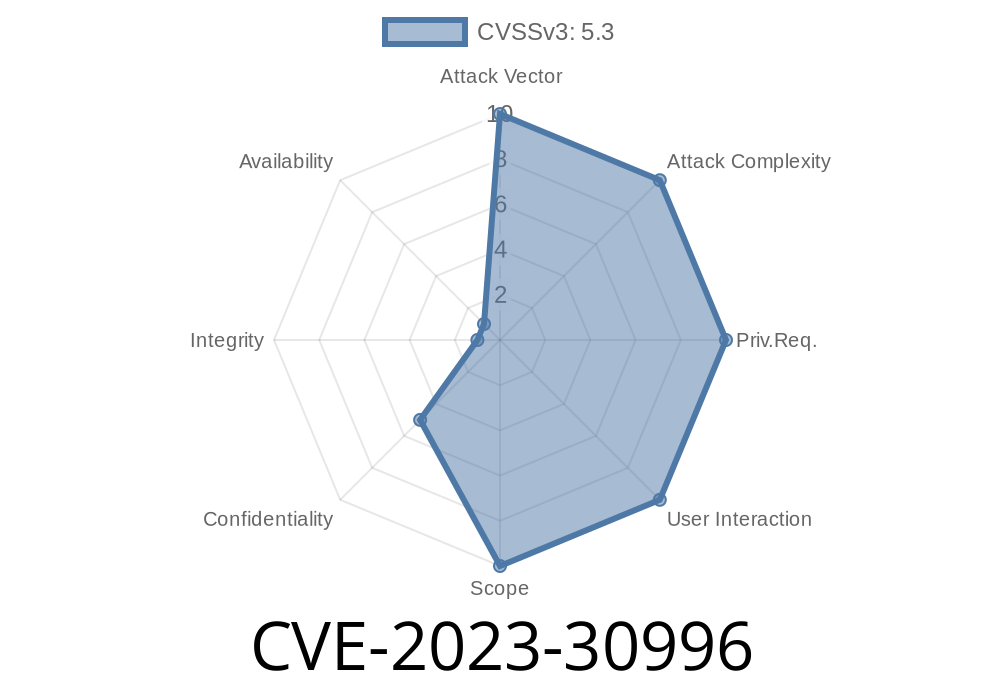IBM Cognos Analytics is a powerful business intelligence platform used worldwide to help organizations visualize and analyze data. However, like many complex applications, Cognos Analytics is not immune to security vulnerabilities. In 2023, IBM disclosed a notable vulnerability, identified as CVE-2023-30996, that could potentially lead to sensitive information leakage. In this deep-dive, we’ll break down what this vulnerability is, how it works, and what you can do about it.
References:
- IBM Security Bulletin
- NVD Entry
- X-Force Exchange
What Is CVE-2023-30996?
CVE-2023-30996 is an information disclosure vulnerability that exists because Cognos Analytics does not properly confirm the source of messages sent between Windows objects (like “windows” in the browser) of different origins.
“Origin” in the web security context means the protocol + domain + port. For example, https://company-data.com and https://evil-attacker.com are different origins even if they run similar apps.
Cognos Analytics typically uses browser windows, iframes, or popups for its UI. If one window can message another without checking where the message came from, there’s a risk: a carefully crafted malicious site could sneak in and trick Cognos into leaking information via these messages.
Here’s a simplified outline
1. Opening a Window/Iframe: Cognos Analytics opens new windows or embeds iframes during regular operation.
2. Cross-Origin Messaging: The application uses window.postMessage to send messages between these windows or frames.
Lack of Origin Validation: The receiving code doesn’t always check the sender’s origin.
4. Attack: A malicious attacker could open a frame or window to the Cognos web app, send it crafted messages, and potentially receive leaked sensitive responses.
Visualizing the Issue
Let’s say your Cognos Analytics server runs at https://cognos.company.com.
Imagine the vulnerable code (simplified for clarity)
// Listening for messages
window.addEventListener("message", function(event) {
// FLAW: Doesn't check event.origin!
if (event.data === "getSecretInfo") {
// Send sensitive information back
event.source.postMessage(secretSessionData, event.origin);
}
});
An attacker could exploit this with a few lines of JavaScript
// Attacker-controlled site (evil.com)
var targetWin = window.open('https://cognos.company.com', 'cognosWin');
targetWin.postMessage("getSecretInfo", "*");
window.addEventListener("message", function(event) {
console.log("Leaked Cognos data:", event.data); // <-- Sensitive info here!
});
They use postMessage to ask for sensitive info.
4. The Cognos window receives the message and, because it doesn't check the origin, sends the information back.
What data might leak? Depending on the implementation, this could be
- Authentication tokens / session cookies (especially those present in window variables)
Configuration data, server variables, or more
All without needing to bypass authentication directly. This kind of bug is especially dangerous in a BI tool, where sensitive business data and dashboards live.
Always validate the origin of incoming messages! For example
window.addEventListener("message", function(event) {
if (event.origin !== "https://cognos.company.com") {
return; // Ignore messages from unknown origins
}
// process message safely
});
IBM has released patches to address this issue in supported Cognos Analytics versions. If you’re managing Cognos:
- PATCH IMMEDIATELY – Go to IBM’s support page for Cognos Analytics and get the latest update.
- Audit Custom Code and Extensions – If you have custom pages or SDK integrations, check for misuse of postMessage.
- Educate Your Team – Make sure web and BI developers understand the risk of mixed-origin messaging.
References & Further Reading
- IBM Security Bulletin: CVE-2023-30996
- National Vulnerability Database
- IBM X-Force Exchange CVE-2023-30996
- MDN: window.postMessage() Security
Summary
CVE-2023-30996 is a textbook example of why origin-checking is essential in any web application using window.postMessage for communication. While the flaw is simple, the consequences are not. If you run IBM Cognos Analytics, patch now and check for this class of bug in your customizations. With these fixes, you keep your data — and your users — safe.
If you want to see more technical deep-dives like this, let us know! Stay safe out there.
*This article is an exclusive, original explanation tailored for easy understanding. Please reference the provided links for official details and patch advisories.*
Timeline
Published on: 02/26/2024 16:27:46 UTC
Last modified on: 02/26/2024 16:32:25 UTC
